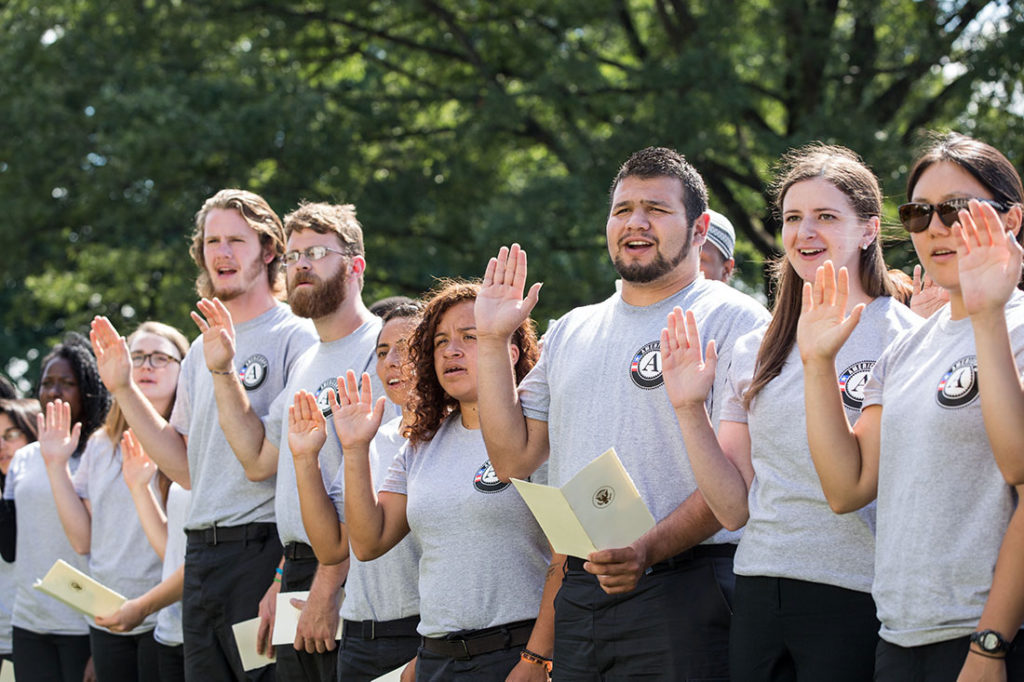Volunteers take the AmeriCorps pledge during an event to honor the 20th anniversary of the AmeriCorps national service program, on the South Lawn of the White House, Sept. 12, 2014. (Official White House Photo by Pete Souza)
The generation that came of age during the Great Depression and helped to carry not just this country, but the developed world, through the Second World War, was deemed by Tom Brokaw to be “the greatest generation any society has ever produced,” and our reverence for their sacrifices has indeed led us to assign them the “Greatest Generation” title almost officially.
We remember their sacrifices not only in terms of the soldiers who gave their lives in the war, but also in terms of our entire society’s mass mobilization. Their experience at home was defined by rationing of raw materials, scrap drives, victory gardens, and a major emergence of women in the workforce, which created a major shift in social patterns going forward.
This shared effort helped to create a new sense of national identity and pride, especially in the context of the prosperous and stable era that it fostered in the wake of the Allied victory.
Since that time, the American way of life, and in fact much of the developed world’s way of life, has come to take that increasing prosperity and stability for granted. People today are less likely to make sacrifices for its sake, and feel increasingly entitled to the perpetual existence of this state of affairs.
But this balance of prosperity and stability has become increasingly tenuous and unsustainable. It is simply hard to imagine a world in which all seven and a half billion people on earth demand the same standard of living to which people in the most developed economies are accustomed. In that scenario, we’d probably burn through our natural resources in about ten years and leave the world a vast strip-mined, deforested, polluted wasteland.
So I think it’s about time we learned, once again, to consider the sacrifices we’re prepared to make, and the legacy we intend to leave to future generations. And young Americans have an opportunity to help lead this global generation, given our country’s continued ability to influence global culture and drive innovation.
A new mentality for those of this generation, emphasizing that the old assumptions about how life should look can no longer be taken for granted, has the potential to do a lot of good for the country and the world. Not only would it help to advance a better way of thinking about the resources that we use, leading to a more balanced and sustainable lifestyle, but it could also engender a sense of national solidarity, of the type created by previous challenges to which we rose together.
One of the major contributors to our current polarized environment is, essentially, the lack of a national enemy. Our collective focus on defeating the Nazis and their fascist partners gave way to the Cold War, and when our global foil then was vanquished, our fighting tendencies turned inward. Our new era of polarization seems to have begun in earnest with the fall of the Soviet Union.
Since the collapse of our collective foe, the threats to our wellbeing have become much more diffuse and difficult to identify. They range from the impersonal threat of catastrophic climate change, to the economic threat of rising powers like China and India, to the threat of violence from powers like North Korea and Iran, and violence by non-state actors like terrorist groups, both domestic and international, motivated by a wide variety of creeds, including religion, ethnic and racial animus, and economic insecurity.
It clearly takes a wide-ranging approach to meet all of these threats, and so the sort of sacrifice that’s needed is equally broad. One element that should definitely be included is a requirement that all of our young people serve their country in some formal capacity.
There are several countries around the world that require some sort of national service from their young people, though most of them require that service to be rendered within the military. Military leaders in the United States, however, have generally argued against the reinstitution of a draft, given that it would be both expensive and logistically difficult to implement. And beyond that, there simply wouldn’t be enough room or need within our military services to accommodate everyone under a certain age.
Instituting a requirement to serve in some capacity, which could certainly include the military, but could also include the large number of other service organizations that exist here, like AmeriCorps and Peace Corps, would be a much more effective way to go. This is an idea that was introduced on the floor of Congress multiple times by former Rep. Charles Rangel of New York. While it failed to garner enough support in the past, the case for “Universal National Service” has become even stronger in the years since.
It’s not just that the sacrifices we share help to bind us together. It’s also that the act of coming together to meet our challenges literally brings us into contact with people whom we would otherwise have never met. One of the main requirements of national service could be to engage in that service outside of our own communities. When we’re exposed to people from other regions and backgrounds, it naturally expands our conception of who is like us, and who should be included in our circle of concern.
In Braver Angels workshops, we so often hear participants conclude that their supposed political opposites are much closer to themselves than they’d imagined. Simple exposure to different groups of people is more powerful than anything else when it comes to growing our sense of shared empathy. A set of service programs that helped to mingle young people from around the country, through work to strengthen our country, would help expose them to those who look different, sound different, and have very different ideas about what it means to be an American.
Such a mandatory national service program would be logistically challenging, and still probably difficult to get through Congress. We would need to have a thorough conversation around the types of service programs that are included and the value they accrue to the national good.
But fortunately, the National Commission on Military, National, and Public Service—created in 2017 through bipartisan efforts led by the late Republican Senator John McCain and Democratic Senator Jack Reed—is working on some ideas, and the American public has a chance to influence the Commission’s work prior to its release of a final report in March of next year.
Universal national service remains a highly worthy proposition, given the potential gains to our civic unity and ability to address the looming challenges that face our nation. In the wake of a holiday that reminds us of the sacrifices of past generations, I think it’s right for us to help define what sorts of sacrifices we expect from ourselves now and in the future.





2 thoughts on “The Case for National Service”
Totally agree. A required “National Service ” program can indeed unite Americans to a “common” cause. Maybe required service for 1-2 years after College graduation.
America needs a BIG unified goal or objective. Young Americans need to be better educated on American History and the sacrifices made to preserve our Democracy. We were unified for WWI, WWII, Korean War, National Expressway System, Landing Man on the Moon, etc. Depolarization can be stopped by calling out the biased Mainstream Media and bickering do nothing Congressional leaders. Demanding Term limits (2-4 year terms and done) should be our voters first initiative. That should be on the ballot in every state.
I participated in the AmeriCorps 2 year program in my 60’s. It taught me skills which I still use today. It also provided a valuable tax free income at an important transition time in my life. Yes, the opportunity to work with other cultures was important. However, I also sensed that the program itself needs to expand its’ training beyond the “politically correct” messages I received. All things considered, it was one of the most rewarding experiences in my life. I would also recommend sister organizations like SeniorCorps which would appeal to other generations. Moreover, there are a multitude of Christian organizations which are not only aimed at other cultures and buy also integrating them into our culture..